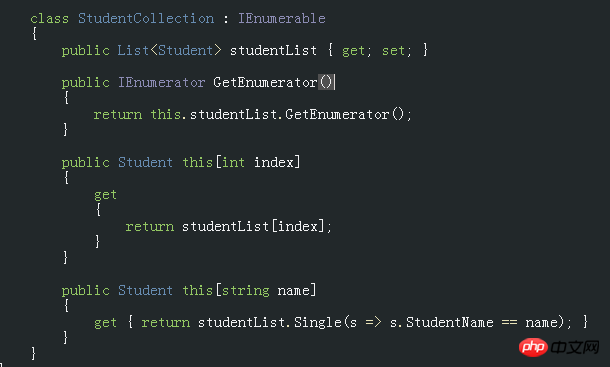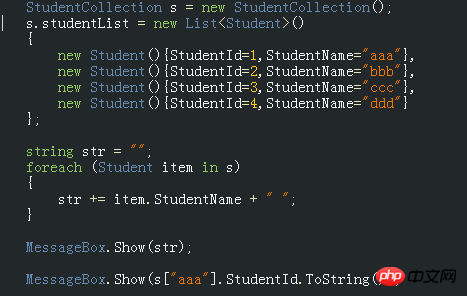Home >Backend Development >C#.Net Tutorial >Detailed explanation of sample code of c# index and iterator
Detailed explanation of sample code of c# index and iterator
- 黄舟Original
- 2017-03-04 10:16:211536browse
C
is a design idea and design pattern. In C#, an iterator can be easily implemented, that is, Ienumeratorinterface. For example, I have a student class, and now I want to encapsulate a studentCollection. The code is as follows:
Student Class:
StudentCollection Class:
Class:
Very simple encapsulation, only There is a field, that is  studentList, the type is list1f479e44f2c9bd2301ecbd2b69e4d7bf, and implements Ienumerator I used the interface code with the help of studentList, because this class implements this interface, so just use it. In this way, I can foreach traverse studentCollection:
studentList, the type is list1f479e44f2c9bd2301ecbd2b69e4d7bf, and implements Ienumerator I used the interface code with the help of studentList, because this class implements this interface, so just use it. In this way, I can foreach traverse studentCollection:
Code description: 
##1. newA studentCollection object, and use an initializer to initialize each one by one studentObject
2. Use foreach to traverse each student
3. ## 取 3 3 3 3 3 3 3 3 3 to the string, and then pop up the prompt box display #
Is there any other way to implement the Ienumerator interface? The answer is yes, the code is as follows:
##
public IEnumerator GetEnumerator()
{
foreach (Student s in studentList)
{
yield return s;////使用yield关键字实现迭代器
}
}
##About index symbol and index symbol overloading:
Careful readers may have discovered that in the studentCollection class , I defined two index characters:
////Access through index
public Student this[int index]
{
get
{
return studentList[index];
}
}
////Access by student name
## public Student this[string name]
{
get { return studentList.Single(s => s.StudentName == name); }
}
The index overloading mechanism enables encapsulation Appear more flexible and powerful.
## The above is a detailed explanation of the sample code of c# index and iterator For more related content, please pay attention to the PHP Chinese website (www.php.cn)!

